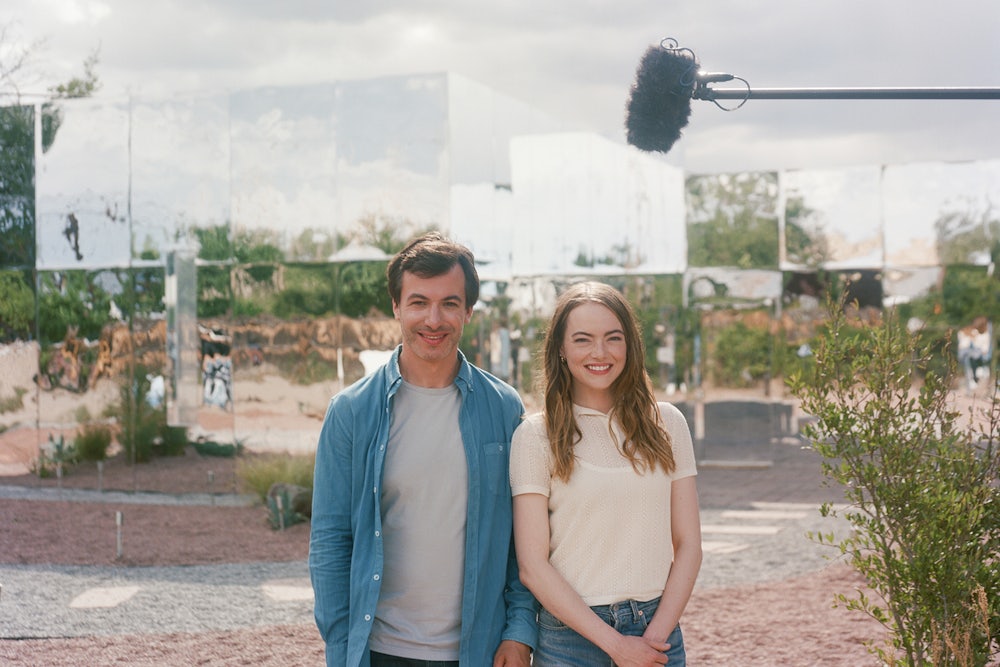There are two kinds of nightmares in Showtime’s surreal HGTV satire The Curse. The first is the kind of nightmare that warps and distorts the recognizable world, making you feel ill at ease in your own skin. It’s a sparely furnished suburban home completely covered in mirrors—the sun blindingly reflected at passersby, the house itself basically invisible except for the seams between panels where the surrounding figures and landscape become distorted beyond recognition. The second kind of nightmare is of a more intimate sort, the type of harrowing social encounter that haunts your subconscious for years, even decades. Within that mirrored house, it’s the scenes of a dissolving marriage, a pair of crumbling facades getting harder and harder to watch.
The show, created by Nathan Fielder and Benny Safdie, revolves around Whitney (Emma Stone) and Asher Siegel (Fielder), two up-and-coming house-flippers in Española, an economically depressed suburb in New Mexico. Whitney, the daughter of a pair of slumlord real estate developers from Santa Fe, is eager to make a positive mark on the region by tearing down homes and constructing “passive houses,” whose bizarro design features—like mirrored exterior walls and pressurized interior rooms—supposedly offset their environmental impacts. She and her husband, Asher, are also eager to make extra money and burnish their brand off of this venture, which is why they’ve contacted sleazy, damaged producer Dougie Schechter (Safdie) to help turn their project into an HGTV pilot.
Whitney and Asher’s goal is to transform Española the same way that Chip and Joanna Gaines’s Fixer Upper turned Waco, Texas, into a middlebrow tourist destination and the epicenter of a global brand. All they need to do is stimulate the local economy, reduce the town’s carbon footprint, and raise the value of all the cheap land they own in the vicinity. It doesn’t help that the locals do not appear to welcome the experiment (they often respond to the couple’s grand gestures—a job offer or free housing—with blank stares), or that prospective homebuyers want gas stoves and security cameras, not induction and goodwill. Whitney is painfully aware that the whole town is built on land stolen from Native Americans (though completely uncommitted to giving any of it back), and even more painfully intent on getting prominent native people to give her project their blessing, whether they care to or not.
All of this is enough to make a viewer uncomfortable, but what ties the claustrophobic room together is the discomfiting hybrid aesthetic of two of the most aggressively alienating screen artists of their generation. In the films he’s made with his brother, Josh, Benny Safdie has managed to infuse the paranoid 1970s crime thriller with existential panic, crafting grimy tales of small-time lowlifes that whirr with a frenetic pulse. Fielder, for his part, has made boilerplate alt-comedy cringe into performance art, mortification after mortification, from the prank-adjacent capers of Nathan for You to the melancholy social experiments of The Rehearsal. The Curse draws upon both of these awkward auteurs to bathe almost every second of this real estate fantasia in cosmic dread.
But to what end? The Curse is unpleasant to watch, yes. It expertly parodies many of its objects of scorn. (It includes a pitch-perfect rough cut of Asher and Whitney’s show.) But nothing about this is entirely new: Its critiques—of reality TV, gentrification, cultural appropriation—are all fairly standard, even cliché. The real interest of the show lies in the production of cringe itself. What if the full-body revulsion, the scrunch-nosed silent shriek with which viewers greet on-screen social snafus, held serious moral weight? This is not the lovable, relatable cringe of Curb Your Enthusiasm or Fleabag; this is an unblinking portrait of the insoluble awkwardness that accompanies pervasive cruelty and carelessness, and an experiment in the limits of televisual discomfort. You’ve seen satire like this before, but the aggregate, nightmarish, ritualistically mortifying experience of this series across 10 episodes is likely something you haven’t experienced on the small screen. You may not like it, but this is what peak performance looks like.
The titular curse both is and isn’t an engine of the story this show has to tell. Early in the first episode, Asher and Whitney are in the midst of a production crisis. In an interview with a local TV news journalist, Asher loses his temper. The moment is caught on film, and the crew is left to figure out how to quash or spin the potentially disastrous footage. Killing time in a strip-mall parking lot, Dougie suggests that he film Asher buying a can of soda from a young Black girl (Hikmah Warsame) selling them on the street. The disingenuous optics of the moment are crudely obvious, even to Asher, but he agrees anyway. What transpires is a pure distillation of the show’s Larry David-by-way-of-David Lynch aesthetic. Asher buys the can, woodenly thanking the little girl, Nala, but he only has a $100 bill in his wallet. After he thinks the camera has cut, he tries to convince Nala to let him have the bill back so he can get some change and give her a more appropriate sum. Eventually, he snatches the money and Nala screws her eyes shut. “I curse you,” she says, with feeling.

The show never really decides whether this moment is the premise for a postmodern sitcom or a psychological horror series. Are we watching a hapless man bumble through life under the mistaken impression that the curse really has power over him, or are we seeing someone being genuinely tormented by the supernatural? Signs and wonders do occasionally manifest throughout the episodes, and plenty of ordinary, consequential things go wrong for Whitney and Asher. They get tepid, unencouraging notes from the network; they learn that the local businesses they’ve propped up to prove their positive impact on the community will only stay open during filming, which makes the project feel like a sham; birds constantly fly into the mirrored walls of Whitney’s houses, dying of either blunt force trauma or embarrassment.
Yet most of these misfortunes are plausible as mishaps, and in many cases they are the results of Whitney’s and Asher’s own selfish behavior. We get a sense of this dynamic in the show’s very first scene. Whitney and Asher are filming an interview with an unemployed local man and his terminally ill mother. They offer the man a job in their coffee shop, but the mother’s reaction doesn’t look big enough on-screen. So Dougie drops fake tears in her eyes. Whitney and Asher are visibly aghast, but they put up little resistance. Noting their complacency, Dougie moves in to spray menthol in the woman’s eyes—he wants them to appear reddened, as if from truly crying. This sequence is horrifying in its blunt revelation of the depths to which Whitney, Asher, and Dougie will each agree to descend in the service of the show. When, later, the son comes knocking on their door with a series of accusations and an armed posse, the hosts may simply be reaping what they sow. Insofar as Nala’s curse plays into any of this, it serves mainly as a way to demonstrate both Asher’s delusion and his blinkered self-awareness: Giving him a sense of being doomed makes him, as a character, perhaps more open to naming the many sins he’s trying to escape.
Likewise, the “passive houses” that Whitney designs and sells aren’t the subject of the show in themselves (as they would be on a bona fide real estate show). Instead they serve as—quite literal—mirrors to her anxieties, insecurities, and remorse. Perhaps the most central of those anxieties is Whitney’s self-consciousness about her—and her project’s—relationship to Indigenous people in the area. In another of the show’s precision-crafted set pieces, Whitney and Asher attend an art opening by a Picuris Pueblo conceptual artist named Cara. For the performance piece at the center of the exhibit, Cara sits in a tepee with a meat slicer. Guests enter the tent one by one; Cara slices some lunch meat onto a plate and hands it to the guest. When Whitney is handed the plate, she looks around confusedly and then proceeds to eat the lunch meat. Cara screams, and then looks at Whitney. “Why did you do that?” she asks plaintively.
Coming from Cara, it’s obviously meant to prompt white guests to investigate their own motivations for interacting with native art and culture; it’s also a question the show is clearly asking itself. Why are Fielder and Safdie doing this?
The best things about The Curse are its two central performances. Emma Stone has maybe never been better than she is here, playing a woman who has sealed herself up inside multiple layers of performed personality. Her easy charm, her patronizing high-handedness, her guilt, her entitlement, her desperation to be something other than she’s become—these varied aspects of Whitney explode chaotically from Stone’s tightly coiled body. And Fielder, who has usually played the low-affect master of ceremonies in his prior docu-comedies, really shows his range here. Though there are set pieces—a botched casino heist, in particular—that feel like bits from Nathan for You, he lets loose a handful of moments of vein-popping fury that wouldn’t feel out of place in a Paul Thomas Anderson film. If The Curse ever fully delves into horror, it’s because Stone and Fielder play these easily mockable normies as both incredibly scared and surprisingly scary people.
Behind these performances, The Curse has a big thing to say about the easy collapsibility of progressive values, the fragility of good intentions, the limits of capitalism as a mechanism for undoing the many crimes of capital. Its most trenchant insight is that the reason those values fail, the reason that people—white people in particular—with good intentions so often overpromise and under-deliver on their ideals is that, at the end of the day, it’s hard to talk to people. This is, in some ways, the grand conceit of Fielder’s The Rehearsal: The fundamental problem of society is that every second of interaction with another human being brings with it the possibility of humiliation and embarrassment.
Over and again, the characters on The Curse do wrong because doing right is more awkward. When Asher is trying to find someone to break the $100 bill, he bursts into a juice bar. The cashier won’t accept hundreds, but he points to an ATM in the corner. Asher can’t get it to work, and an older man in the store offers to help. Turns out, there’s a trick to pressing the buttons on the dilapidated machine. The man asks Asher for his PIN so he can help him enter the numbers. Fielder lets us watch the entirety of Asher’s anxiety about sharing his PIN; he also lets us see the full, banal sadness of the man fully understanding why Asher won’t share the numbers. By the time he gets over the awkwardness of the moment, Nala is gone; his chance to undo the damage has passed. Opening oneself to humanity is awkward; connecting with another person is awkward; progress is awkward. The Curse gives us a show that understands the “cringe” as a debilitating social, even cultural, problem.
In order to make that point, The Curse has to be a lot more awkward than we are used to on TV. In some ways, in fact, it plays off of its audience’s relative desensitization to cringe. Larry David is a lovable meme; The Office came to America and somehow paved the way for a new televisual sentimentalism; the mockumentary look to the camera transformed from a desperate appeal for escape to the cuddliest, most intimate gesture on television. In The Curse, cringe is what it feels like for the world to end. When Whitney gets her head stuck in a sweater and Asher struggles to pull her out, the two stumble into a small, intimate moment of reconnection. It feels, briefly, good. When Whitney insists they restage the moment as a viral video to share on socials, and Asher keeps his merciless phone camera going for take after miserable take, we feel a weight greater than vanity or shallowness. These long sequences are a key to Fielder’s directorial style. The setup happens, the cringe occurs, and then we have to sit in it until our souls are sick. Whatever object or action is being satirized is, at best, a secondary target. What we’re left with is emptiness. The cringe is the soul leaving the body.
Watching The Curse, I thought a lot about Squid Game. Netflix’s surprise hit is a literal theater of cruelty, death, poverty, and sadness. But it was nevertheless one of the most binged series in the history of Netflix. Despite all the hard-to-watch elements within it, the show was a hit because people couldn’t stop watching. It was a hit because all that horror was, counterintuitively, easy to watch. In some ways, I wonder if the true target of The Curse’s satire is a show like Squid Game or Game of Thrones or even still-cringey but more palatable half-hour comedies like Girls or Fleabag or Curb. Since, shouldn’t some things be hard to watch? Shouldn’t some things give us nightmares? Don’t those antiheroes deserve to be punished? Don’t we?
If that’s the case, then my hat is off to Fielder and Safdie. They have taken two extraordinary performances, a series of minor masterpieces of formalist direction, and however much money Showtime gave them, and they’ve turned all of that into an aggressively artful bad time. They have given me the nightmares they felt I should have. But I also find that, upon waking, and in retrospect, I’ve thought very little about The Curse; its images effectively unsettled but did not haunt me. Especially after viewing the befuddling final installment of the series, I am left wondering about the possibility that this was all an elevated film school project, a pretentious, prestigious episode of Punk’d. There is something undeniably exciting about Fielder’s and Safdie’s commitment to the bit, their formal self-abnegation, their virtuosic weaponization of banal misery. I will remember the grime and hollowness and transcendent meaninglessness of The Curse, and I will remember the strange and even daring things it did to me as a viewer. But I won’t remember why, if I ever knew in the first place.




